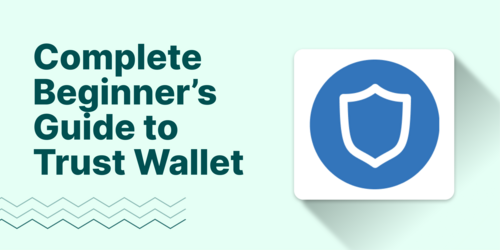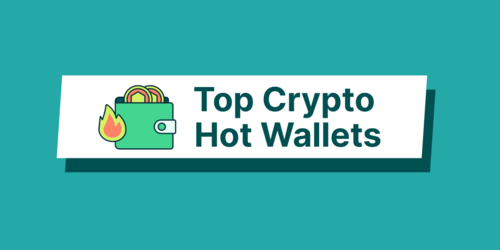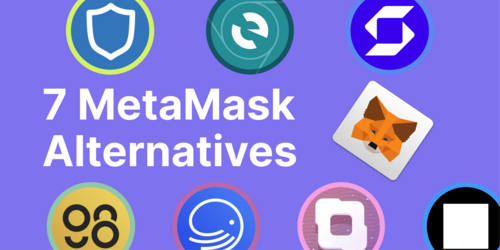Key Takeaways
-
Trust Wallet supports multiple cryptocurrency networks and assets, including bitcoin. Users can perform basic transactions and also interact with decentralized applications built on supported networks.
-
MetaMask is developed by Consensys and supports the Ethereum blockchain and smart contract tokens on the network. It can also support smart contract networks that are EVM-compatible like Layer 2 networks and cross-chains.
-
Trust Wallet and MetaMask are both available for mobile and desktop devices to allow easy access and use of cryptocurrency.
-
Trust Wallet offers more diversity in supported networks while MetaMask is limited to Ethereum and other EVM networks.

The common cryptocurrency investor hopes to profit by trading cryptocurrencies. To do so, they need a secure place to store their crypto assets, which is where crypto wallets come into play. Cryptocurrency wallets can be anything from your (centralized) exchange account to a hardware wallet. With several available wallet options designed to meet certain needs, investors are often torn between non-custodial wallets and the convenience of leaving their assets on exchanges where they trade.
With the collapse of FTX shaking consumers’ confidence in centralized exchanges (at least until Proof of Reserves is implemented), a non-custodial software wallet is emerging as the hot wallet of choice for users to store their crypto in between trades, due to the combination of convenience and ownership it offers. In this article, we’ll look at two of these wallets – MetaMask and Trust Wallet – and see how they compare against each other.
What is MetaMask?
MetaMask is a cryptocurrency wallet that supports the Ethereum blockchain, Layer 2 networks, and standalone EVM-compatible blockchains. MetaMask allows you to use any EVM network of your choice by following a few easy steps, as seen in this BNB example. With its connectivity, MetaMask presents a gateway to decentralized applications while allowing easy access to crypto assets.
The MetaMask wallet is developed by Consensys and is supported by notable Ethereum developers and the overall community. To date, the MetaMask wallet is used by over 10 million cryptocurrency enthusiasts and is one of the most used DeFi wallets.
The MetaMask wallet comes in browser extensions, as well as applications that can be installed on Android and iOS mobile devices.
Reasons to use MetaMask
Like many mobile wallets, MetaMask offers an easy connection to web3 applications while offering a non-custodial solution to store your assets.
So what sets MetaMask apart?
Popularity
MetaMask has received support from the original Ethereum community and core developers. It has gained a huge following amongst Ethereum investors and other EVM blockchains communities. This is evident in the millions of cryptocurrency investors using the wallet. At the time of writing, MetaMask’s Chrome extension has registered over 10 million downloads while the mobile wallet has an excess of 15 million downloads across Android and iOS app stores.
Popularity comes in as an important factor because a huge community of users means a large pool of resources is available for reference in case there is a need for extra information on how to use the wallet. It also makes it easier to get assistance from the community when you’re looking to run certain operations on your wallet. It also means that important announcements and application updates are easily communicated to users.
Flexible Support for EVM blockchains
An explorative cryptocurrency investor is always searching for new projects that are related to ones they already know. Over the past three years, EVM-compatible blockchains have been proliferating. Each one offers improved efficiency and cost-effectiveness as an advantage over the original Ethereum blockchain.
Each new EVM blockchain claims to have better technologies, creates a new ecosystem, and tries to lure new users, sometimes with an airdrop. If you are an EVM enthusiast always looking to try out new EVM chains, then you might want to consider using MetaMask for this reason.
MetaMask’s technology allows new EVM networks to be integrated into the wallet by adding the network properties, which can be done through a blockchain explorer where available, or by entering the RPC details. Users can easily switch between installed networks while accessing decentralized applications on any of these networks and performing Peer-to-Peer transactions.
This feature gives MetaMask an edge, as there is no need to wait for the wallet developers to officially integrate new networks on their applications before you can access new ecosystems.
Ease of Access and User Interface
The MetaMask wallet is available for every smart device. The application can be installed and maintained on any of these devices; no extra network needs or special device capabilities are required.
The MetaMask interface is comprehensive for basic transactions. The action buttons are marked for easy understanding and user instructions are available for most procedures, enabling casual investors with minimal knowledge of the technology to understand and use the wallet.
Compatible with Hardware Wallets
Hardware wallets like Trezor and Ledger offer users a more secure way to store cryptocurrencies, especially for long-term hodling. However, many investors prefer the use of mobile wallets for everyday use. If your crypto assets are split this way, MetaMask offers a simpler way to manage your hardware wallet in combination with your mobile wallet, as hardware wallets can be connected to the MetaMask mobile wallet.
Check out how you can connect your hardware wallet to your MetaMask mobile wallet.
Limitations of MetaMask
While MetaMask works well for some crypto investors, it lacks certain features that make it unsuitable for a good percentage of cryptocurrency investors. These limitations include:
EVM Maximalism
MetaMask is so focused on the Ethereum blockchain and its core technology, so much so that it has only developed support for EVM blockchains and hasn’t shared any plans of changing this narrative.
Cryptocurrency investors who use MetaMask will have to rely on multiple mobile wallets to store other crypto assets like Bitcoin, Bitcoin Cash, Tron, and any other tokens that use other blockchain networks that aren't defined with parameters like EVM chains.
For investors with holdings across multiple chains and looking for the convenience of a single wallet, MetaMask's limited focus on Ethereum won't work for their needs.
Manually Adding Custom Blockchains
One of the distinctions of MetaMask that we’ve discussed is the feature that allows you to add any EVM network once you have the network details. While this comes in handy, the process of collating these details and using them to set up a network can be time-consuming.
When compared to other mobile wallets that pre-install networks for users, MetaMask might come off as a second choice for investors who are less adept at setting up the network manually.
This leads us to Trust Wallet, another relatively popular mobile wallet that comes in as a competitor to MetaMask.
What is Trust Wallet?
Trust Wallet claims to be a secure medium for storing crypto assets, with a recorded 10 million downloads on the Google Play store and a reported 5 million downloads on the Apple store since its launch on November 2017. Trust Wallet enjoys quite a special reputation, thanks to its relationship with the largest cryptocurrency exchange in terms of daily trading volume – Binance Exchange.
Trust wallet is a multi-chain wallet. This means it is built with support for different cryptocurrency networks with markedly different modes of operation. As of July 2021, it is confirmed to be supporting over 33 chains, ranging from payment solution blockchains to enterprise-level smart contract blockchains.
Trust wallet also provides a gateway to decentralized applications through an in-built browser and the ‘WalletConnect” protocol. Trust Wallet is available for personal computers as well, and users can install the Trust Wallet extension on desktop browsers.
Reasons to Use Trust Wallet
Here are some reasons why you, a crypto investor, might consider using Trust Wallet to secure your crypto assets:
Variety of Cryptocurrency Support
Trust Wallet’s multiple-chain support is an attractive feature for investors who diversify and wish to hold all their assets in a single wallet. Investors also have the choice to use just a single chain. Trust Wallet goes beyond the Ethereum focus seen on MetaMask and embraces the crypto space with pre-set connections to EVM chains and other blockchains.
Being able to manage your assets from a single point helps investors coordinate their portfolio and get a glimpse of their wallet status at a glance.
Trust Wallet strives to make sure that multi-wallet users do not lack the basic services for the supported chains. You can connect to decentralized applications for your EVM blockchains and non-EVM chains like Cosmos through your multi-chain account and enjoy the same experience.
Extra Features
Despite supporting so many chains, Trust Wallet is able to provide the technology for basic operations and even extra features for many of the supported blockchains. Extra features on the Trust Wallet application include staking programs, a decentralized application browser, and centralized exchange integrations.
Staking on Trust Wallet
The Trust Wallet staking feature allows you to access staking programs of supported cryptocurrencies from the comfort of your wallet and without visiting any website. The staking feature plugs into the staking portal of the concerned crypto asset and develops an interface for Trust Wallet users to perform the staking transaction without needing to navigate to another site.
You can either choose the crypto asset to stake through the "Discover" tab and the full list of assets available, or you can also head to the token page in your wallet and stake from there.
The staking program is currently available for EVMOS, Luna classic (LUNC), Osmosis, Polkadot, Solana, and up to five other crypto assets. Stakers will be able to select a validator, stake their assets, and manage their staking position from the wallets.
Trust Wallet Decentralized Application (dApp) Browser
The dApp browser is your gateway to the decentralized web. Trust Wallet gives users access to DeFi, GameFi, and routine decentralized applications through the dApp browser. The browser lets users input links to these platforms, connect easily to them and sign transactions from the wallet.
Trust Wallet’s aApp browser section also contains pre-installed links to popular decentralized applications to enable one-click access for users.
Centralized Exchange Integration
Trust Wallet provides users a way to connect to their centralized exchange accounts and transfer crypto assets. The integration feature creates a communication channel between the user’s Trust Wallet account and their accounts on supported centralized exchanges. Trust Wallet currently supports Binance and Coinbase exchange.
Learn how to use the Centralized exchange integration feature.
Even if these above features of Trust Wallet impress you, there are still a few shortcomings that might make you contemplate using the wallet if meeting certain criteria is important to you. Again these limitations aren’t about the wallet’s security (since measuring this particular parameter isn’t straightforward) but could affect your user experience to an extent.
Limitations of Trust Wallet
Some of the limitations of Trust Wallet include:
Doesn’t Support Hardware Wallets
Users of Trust Wallet and hardware wallets will need to devise an alternative way of using their hardware wallets in combination with their Trust Wallet. This is currently not possible as Trust Wallet is yet to develop a hardware wallet support system. We might see this change in the future, however.
No Custom Installation Feature for EVM Blockchains
This is a major caveat for cryptocurrency investors who are interested in trying out new EVM networks before they become popular enough to be added to the list of supported networks. Trust Wallet currently doesn’t have the infrastructure for installation on custom networks. Users will have to stick to using the networks installed by the developers or resort to using Walletconnect (where available) to connect to applications on these networks.
Again, while this might change in the future, Trust Wallet automatically comes off as ‘unusable’ for anyone who is invested (or wishes to invest) in new EVM networks.
Final Thoughts
The major goal of hot wallets is to simply peer-to-peer cryptocurrency transactions while adding a good level of security to personal assets. MetaMask focuses on Ethereum and web3 blockchains while Trust Wallet diversifies with an option to run just one network or more per wallet.
There’s no straightforward answer as to whether MetaMask or Trust Wallet is better; it depends on your needs. If your holdings are primarily on Ethereum and EVM-compatible chains, you may opt for MetaMask. However, if you prefer to hold a variety of cryptocurrencies from different chains on the same wallet (like bitcoin and Ether), you may find yourself more drawn to Trust Wallet.
It is also important to consider your security needs against the need to easily transact with your crypto assets. In this regard, it is important to note that cold wallets are generally more secure and less flexible. Hence, you may want to consider storing a majority of your assets in hardware wallets, and using Trust Wallet and/or MetaMask for routine cryptocurrency transactions. At the same time, always maintain good security practices.
Having said this, do note that this content is purely educational and no part was meant as financial advice. Ensure you perform due research before choosing a wallet or investing in cryptocurrency.

Joel is deeply interested in the technologies behind cryptocurrencies and blockchain networks. In his over 7 years of involvement in the space, he helps startups build a stronger internet presence through written content. Follow the author on Twitter @agboifesinachi






 Or check it out in the app stores
Or check it out in the app stores
